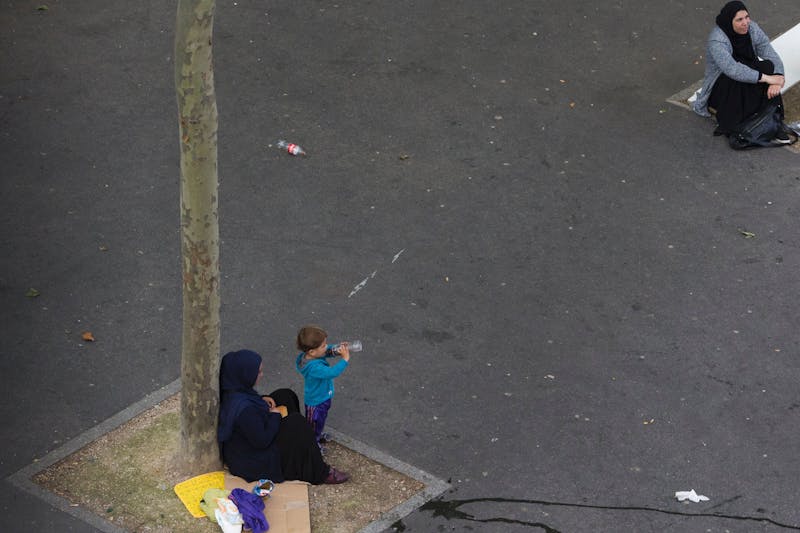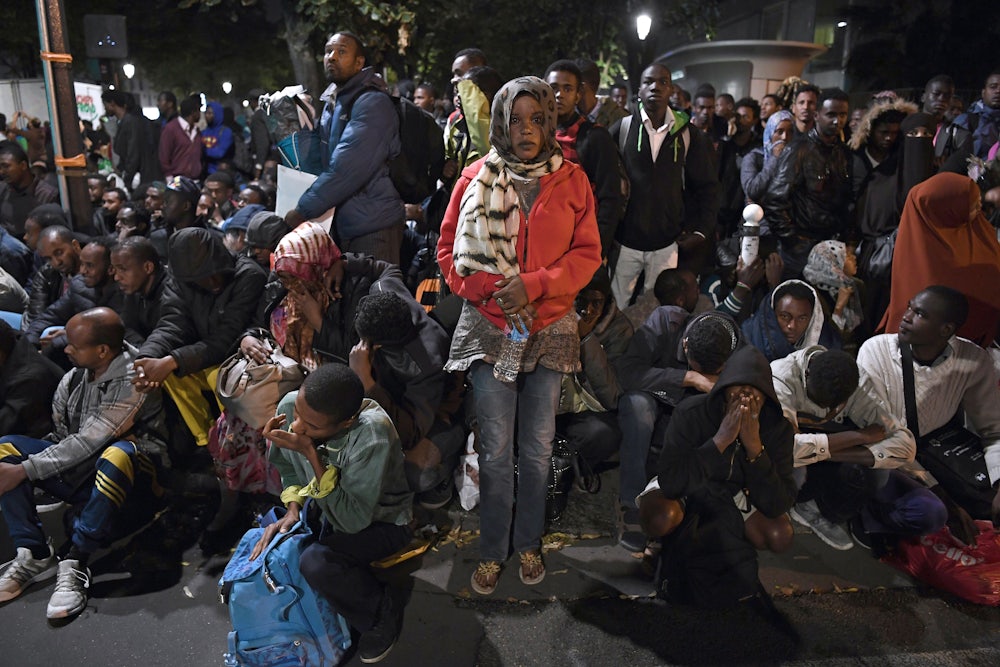When shelters are full, Zara sleeps in hospital emergency rooms. Now 46, she used to work as a nurse in Mauritania. One day, a woman brought Zara her daughter to be “excised”—to have her genitals traditionally severed and sewn up. Zara refused, and the local imam denounced her in a Friday prayer. When two people from the village came after her, saying they wanted to take her to a location about a mile away, she fled, and came here, to France. Her asylum application was refused. She appealed and was refused again. Now, she told me on the phone, she doesn’t know where she’ll go.
On Sunday, the French parliament approved a controversial new asylum and immigration bill, which President Macron’s centrist party claims will speed asylum applications. Critics say it will simply reduce the number of people eligible. But a separate question is whether the bill, like many policies in Western countries, potentially ignores the issue of gender differences in asylum applications—and in so doing, dooms women already fleeing rape as a weapon of war, female genital mutilation, forced marriage, and other gender-based harms to further hardship. If their applications fail, they risk being returned into the hands of their persecutors, a possible violation of international law.
“The bill is, at best, practically gender-blind, if not biased,” said Maxime Forest, executive member of the French High Gender Equality Council and associate researcher and lecturer at Sciences Po. The bill’s only aim, he explained, is to shorten the asylum procedure and to return those who are not granted protection, with little consideration of how this might play out in gender-unequal ways.
France has been reeling since the beginning of Europe’s refugee crisis in 2015, when hundreds of people began arriving at its borders daily. Simultaneously, a series of terrorist attacks, such as the assault on the offices of Charlie Hebdo and the Bataclan theater shooting, increased fear and mistrust. The government ramped up border controls and restricted rights; some of the state’s emergency powers continue today.
Many who entered France around that time languished in the Calais “Jungle,” an encampment that became ground zero for the migrant crisis. But women were especially vulnerable. In March 2017, Gynécologie Sans Frontières (GSF), an organization that began working in Calais in 2015, estimated that 70 percent of refugee women experience violence either in the camps or on their journey to France. Each camp dismantling, the organization found, led to an uptick in sexual violence and requests for abortion.
Some women solicit a “protector” before they officially register with the state. Flora, a woman in her late twenties whose lawyer, Elodie Journeau, I spoke with on the phone, arrived in Paris from West Africa in 2015, fleeing repeated gender-based violence from her father and the man to whom he had pledged her against her will—including rape and genital mutilation.
In Paris, she planned to stay with an acquaintance until she could get on her feet. But this man, she soon learned, expected that she would pay the rent with her body. She refused, and he kicked her out. She sought refuge in the streets of Paris and slept for weeks in a parking lot. There, she was raped twice. She met a woman who directed her to the association Femmes Migrantes Debout—Migrant Women Standing—through which she found legal help and was able to claim asylum. Then, she learned she was pregnant.
“This is not unique at all,” said Amina Shabou, the president of Femmes Migrantes Debout, referring to violence women migrants and asylum-seekers experience on French soil.
In Paris, a short walk from bustling wine bars and trendy cafes, dozens of hopeful asylum-seekers line up for what’s known as the PADA (plateforme d’accueil, or “welcome platform”)—the first step that will register them for an appointment to launch their asylum claim. In the line, overflowing with meters and meters of humans, people sleep and wait for weeks before they get an appointment. While special access is given to families with children, women who are alone must remain in the line. “There’s a good chance she’ll be exploited,” Forest said, explaining that women there are vulnerable to trafficking, sexual violence, and forced labor.
In December 2015, Ula arrived in Paris from Lebanon at twenty-five-years-old. She escaped the war in Syria and traveled by foot, boat, and train to reach France, according to her attorney, Sabreen Al Rassace, the director of the association Revivre, which supports Syrian refugees in France. Ula was suffering from mental health issues after having lived through a forced marriage, gang rape, and dangerous migration journey. But she spoke to Al Rassace of her excitement to be in Paris—the cultural capital of France that would offer her the chance at a new life.
Ula planned to enroll in law school to become an advocate for women and children. She asked for asylum a few days after her arrival in Paris, but was not given housing. Al Rassace said she pressured the French immigration office (OFFI), which is in charge of finding housing for vulnerable individuals. But by the time they found her shelter, six months later, she’d suffered multiple incidents of sexual and physical violence on the Parisian streets. She committed suicide. “This is state violence,” said Al Rassace by phone. “These details are not taken into consideration in Macron’s new project.… It’s not sexy,” she said.
In November 2016, Emmanuel Macron built his presidential campaign around open borders and a humane approach to asylum-seeking. Claiming French society was “sick with sexism,” he also promised to make gender equality and fighting violence against women top priorities of his administration. After successfully winning the Presidency, he vowed to find a solution to the thousands of migrants sleeping outside. He wanted people “off the streets, out of the woods,” he said in July 2017, by the end of the year.
The end of the year came and went, and, still, hundreds remain on the streets. In February, Interior Minister Gerard Collomb presented the administration’s refugee bill to the Council of Ministers as a balanced solution to the refugee crisis. Parliament passed it after seven days of debate on Sunday, and the Senate will decide on the bill in June.

Critics say the bill is far from the humane solution the administration promised. “A wolf in sheep’s clothing,” Andra Matei, a Strasbourg-based human rights lawyer, called it. The law, she argued to me over the phone, compromises fair trial rights and core principles of asylum law and non-refoulement: an international legal principle that stipulates a person must not be returned to a territory where her life or freedom may be threatened.
Under the 1951 Refugee Convention, a person is considered a refugee if they face persecution on account of race, religion, nationality, membership of a particular social group, or political opinion. They must also prove that they are unable to receive protection in their country of origin. In France, a July 2015 law incorporated gender and sexual orientation as a form of persecution under the definition of a refugee, but its application is limited. Women who oppose traditional cultural practices like female genital mutilation, forced marriage, and honor crimes, for instance, and are persecuted because of it, will not be protected under the category of political opinion.
In 2016, even while 90 percent of women applying from Syria, Burundi, Afghanistan, and Iraq were granted asylum according to France’s asylum office, Amnesty International documented the return of 640 Afghans to a human rights situation that may have violated non-refoulement principles. Applicants from other top-ten refugee-origin countries such as the Democratic Republic of Congo (DRC), Nigeria, Haiti, and Albania, had a much lower success rate, between 4 and 41 percent depending on the country.
Part of the issue is the categorization scheme used by many European states: dividing countries of origin into either “safe” or unsafe. Those from “safe countries,” i.e., those the host country’s refugee agency do not deem to be experiencing widespread conflict, have a much harder time procuring refugee status. In France, Albania is considered “safe,” although LGBT people there face widespread violence. France also considers Armenia safe, but Human Rights Watch has said that authorities there fail to protect women and girls against systemic domestic violence, putting their lives in jeopardy.
“That’s really something that I cannot understand,” said Isabelle Thieuleux, a Parisian lawyer who works on gender-based violence asylum cases. “We know in DRC women suffer so much from sexual violence,” she said. But, when they come from Africa, rather than Syria, judges are “so much more suspicious.” Thieuleux has had a difficult time arguing that these women deserve refugee status. It is especially tricky if she tries to claim they face gendered harm under the category of political opinion—a situation like Zara’s.
The “safe country” principle has been widely criticized. Marie-Laure Basilien-Gainche, a law professor in Lyon who spoke with me by phone, said the designation often appears a direct response to increased migration: “to restrain the asylum application considerations.”
Many believe this new bill has a similar objective: “To make it more effective and easy for the government to take migrants coming from abroad … back to foreign countries from where they are coming,” said Thierry Le Roy, the President of France Terre d’Asile, a group that supports asylum-seekers in France.
Up until now, after stepping on French soil, an applicant had to claim asylum, a complicated and paperwork-filled process, within 120 days. The bill shortens it to 90 days. If a woman does not respect the time frame, she will be placed in the same accelerated procedure as those who come from so-called safe countries.

Women in
the accelerated procedure do not receive the material support promised to those
in the regular procedure—such as housing or financial aid—and will have less
time to seek counsel and gather proof, explained Violaine Husson, the director
of the department of gender and protection at La Cimade, one of France’s
largest refugee rights groups. The most
traumatized women—those who’ve been victims of trafficking, sexual exploitation
or modern-day slavery—are those most likely not to meet the time limit, she
believes. “Either they will be deported,
or they will stay in France without any possibility to ask for regularization.”
Journeau agrees: “It is unthinkable to assume that in that time limit a woman can
tell you she’s been raped by fifteen soldiers and has HIV or that she is being
trafficked,” she said.
Those who
receive a negative decision currently have 30 days to launch an appeal before
the asylum court; the bill reduces it to fifteen days. In certain
circumstances, the bill would permit a person who is appealing to be deported
before the judge makes a final decision on the case. Imagine, Journeau
explained, that the court overturns a negative decision and grants refugee
status to the person. The French government would then have to bring the person
back to France. But, in the meantime, the people who were persecuting her in
the first place might have killed her.
In Paris’s streets, pre-dawn, asylum-seekers and migrants living in makeshift camps could be seen getting evacuated. In late February, I watched the chaos and confusion unfold: shoes, plastic bags, and prayer carpets scattered across the concrete near Canal Saint-Denis, where some 500 people had been sleeping, among them women and young children. Some people ran; others boarded buses that would take them to camps around Paris. But most did not know where they would end up. This scene could become more frequent as the government ramps up expulsions. For women like Ula, whose risk of assault jumps with each camp clearance, and have no secure home to return to, the bill’s message is clear: their bodies are expendable.
Zara’s and Flora’s names have been changed for their and their families’ protection.
